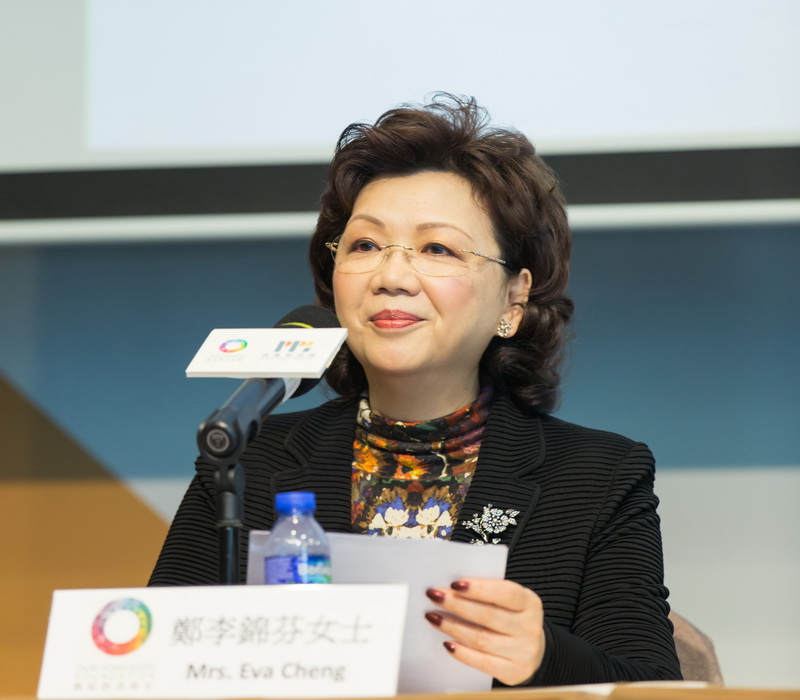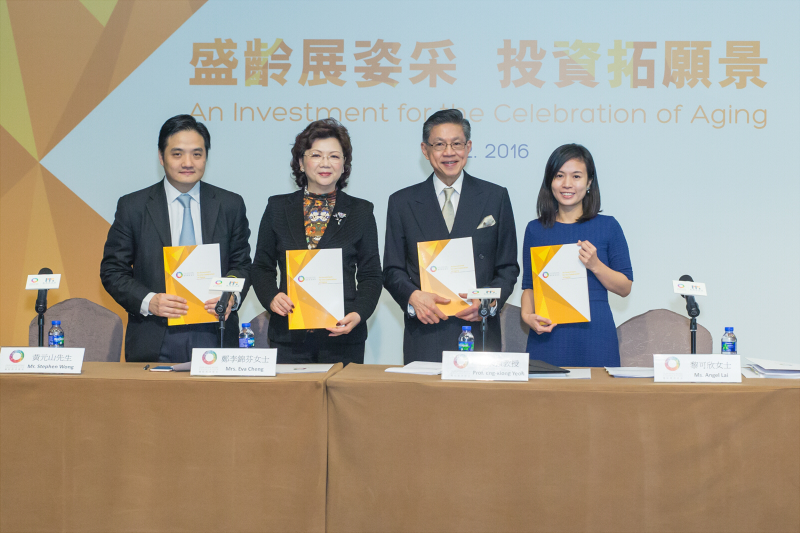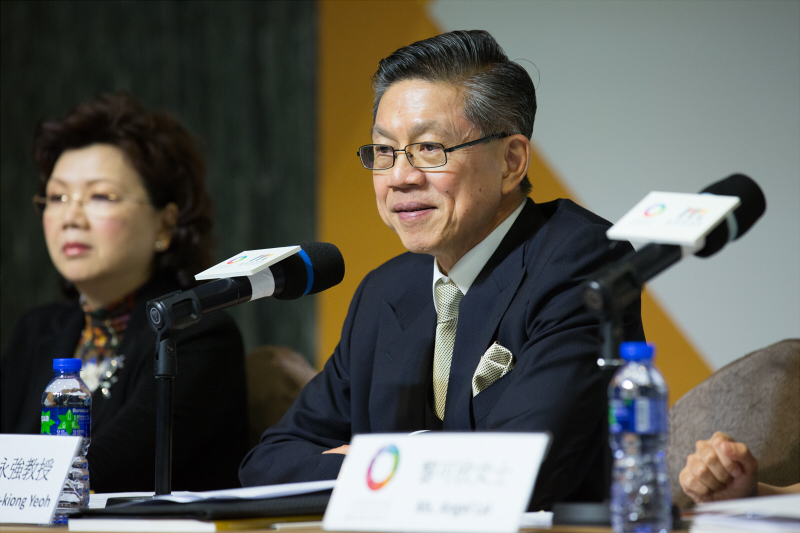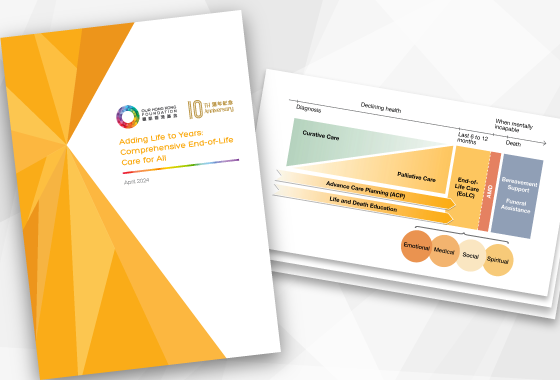Our Hong Kong Foundation Launches Research Report on Population Aging
The report proposes strengthening health & social welfare systems
and creating an age-enabling city
Our Hong Kong Foundation (OHKF) launches the first research report on population aging today. The report points out that Hong Kong is facing unprecedented challenges of population aging, so OHKF recommends the government building an integrated person-centered care system, the specific programs of which are Chronic Disease Voucher Scheme and Health-Enabling Network. The system can increase the health literacy of the general population and lower the demand of health and social care services. The reports also suggests the government creating an age-enabling city with each and every sector of the community in order to better prepare the city for its agingsociety.

formulate health and social services policies which match this status. The policies should meet the needs arising from aging population.
Mrs. Eva Cheng, Executive Director of OHKF, said, "as one of the world's highest-level of income economies, our government should formulate health and social services policies which match this status. The policies should meet the needs arising from aging population. We hope that this report can foster collaboration between government and each and every sector of the community, so as to create a society that is more suitable, conducive and sustainable for an older generation, whom, during their younger days, had contributed to make Hong Kong as it is today.”
Change in Hong Kong’s population structure
Based on projection, the median age of the population of Hong Kong will reach 51* years old by 2064, with more than one in every three people ages 65 or older. This change in the population structure can be perceived as potentially economically and socially challenging, in terms of lower productivity of work force and higher long term social care expenditure. We project the labor force participation rate will decline rapidly from 59.3% in 2014 to 48.6% in 2064. The elderly support ratio will be doubled, with 567 older people per 1000 working-age population.
Human resources are a valuable asset of the society. Every member of society regardless of age can contribute to the society. However, according to data from the Census and Statistics Department, the percentage of Hong Kong people having at least one chronic condition rises sharply once the population reaches 45 years old. The likelihood of those aged 45 to 64 years old suffering from multimorbidity is 6 times more likely than those aged between 14 and 25. For those who aged 65 years old and above, the likelihood of having multimorbidity is 18 times more. Hence, the society is obligated to provide sufficient medical services for all ages to ensure good health.

Introduction of Chronic Disease Management Voucher Scheme
To promote health in Hong Kong, OHKF proposes the introduction of Chronic Disease Management Voucher Scheme. The Voucher scheme takes into account of both screening and management of chronic disease. On the one hand, a maximum of HK$1,000 voucher amount will be provided to the population who are 45 years old and above for screening to ensure early diagnosis and treatment. On the other hand, a subsidy of $3,040 per year will be provided for individuals diagnosed withhypertension and/or diabetes, two most prevalent chronic disease in Hong Kong, to consult a private general practitioner in their neighborhoods. So that all resources in the health system can be fully utilised.
In view of the pressure posed on healthcare service in the community, the report proposes the Voucher Scheme to take effect progressively. Research shows that individuals from low income families are more likely to develop multimorbidity. Therefore, the proposed Voucher Scheme can be first provided on those from low income households. If the Scheme is proven to be cost effective, the government could consider extending the Scheme to the people with higher levels of household income.
Establishment of Health-Enabling Network
Besides, Hong Kong has a higher care homes residential rate than OECD countries. 6.8% of Hong Kong elderly live in residential care homes. Our research recommends the establishment of a Health-Enabling Network, which features partnerships among the Department of Health, the Hospital Authority, the Social Welfare Department and the private sector to build an integrated person-centered care system in order to meet different needs of the elderly in the community.
The Network will cover health promotion and preventive care services, primary care services and rehabilitation services. The report points out that we need to improve the physical and social infrastructure for an age-enabling environment.

should invest to create an age-enabling environment in Hong Kong. Collaboration is necessary between the government, business sector and civil society to formulate policies for aging.
Professor E.K. Yeoh, Director, Jockey Club School of Public Health and Primary Care at the Chinese University of Hong Kong, points out that the community should 'think outside the box' and adopt positive attitude to conceptualise aging, as population aging should be seen as a problem, but an opportunity to create a make our city more age-friendly on the contrary.
Professor Yeoh said, "The society should invest to create an age-enabling environment in Hong Kong. Drawing from World Health Organization's Healthy Ageingframework, we propose nine pillars of an age-enabling city. I believe collaboration is necessary between the government, business sector and civil society to formulate policies for aging.”
Professor Yeoh emphasised that redefining of the retirement age, building of cross-generational solidarity and adoption of new technologies are conductive to create more sustainable aging societies. This will unleash the potentials of our older generation, thus maximise the social capital. We are therefore able to turn challenges from population aging to opportunities.
*If domestic foreign helpers resided in Hong Kong is being excluded, the median age of the population of Hong Kong will reach 53.5 years old by 2064 and the elderly support ratio will be 658 older people per 1000 working-age population.



